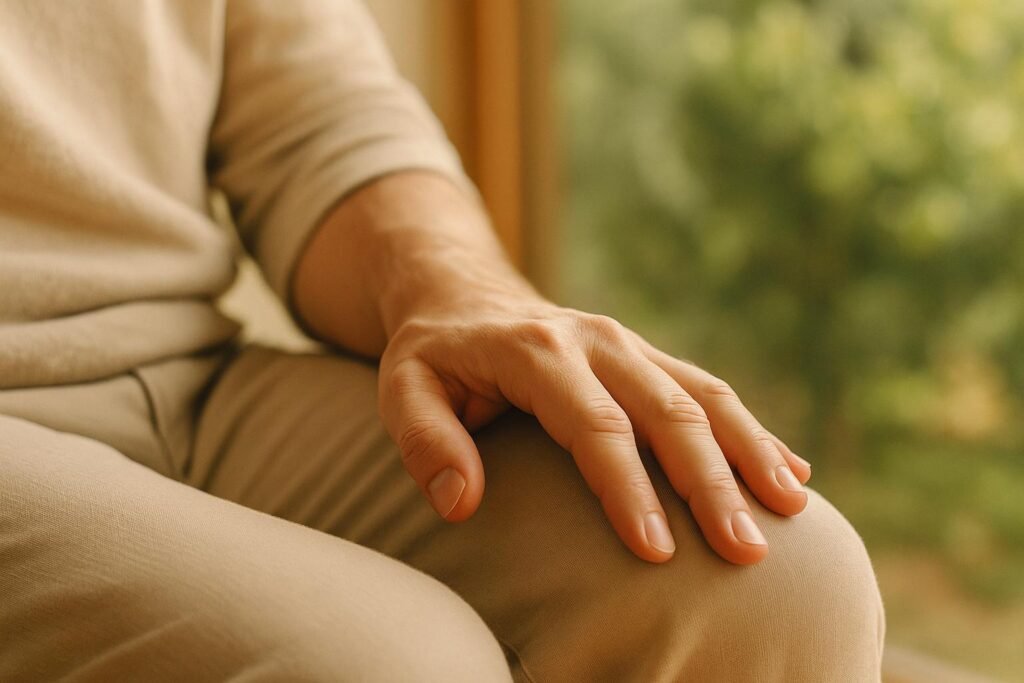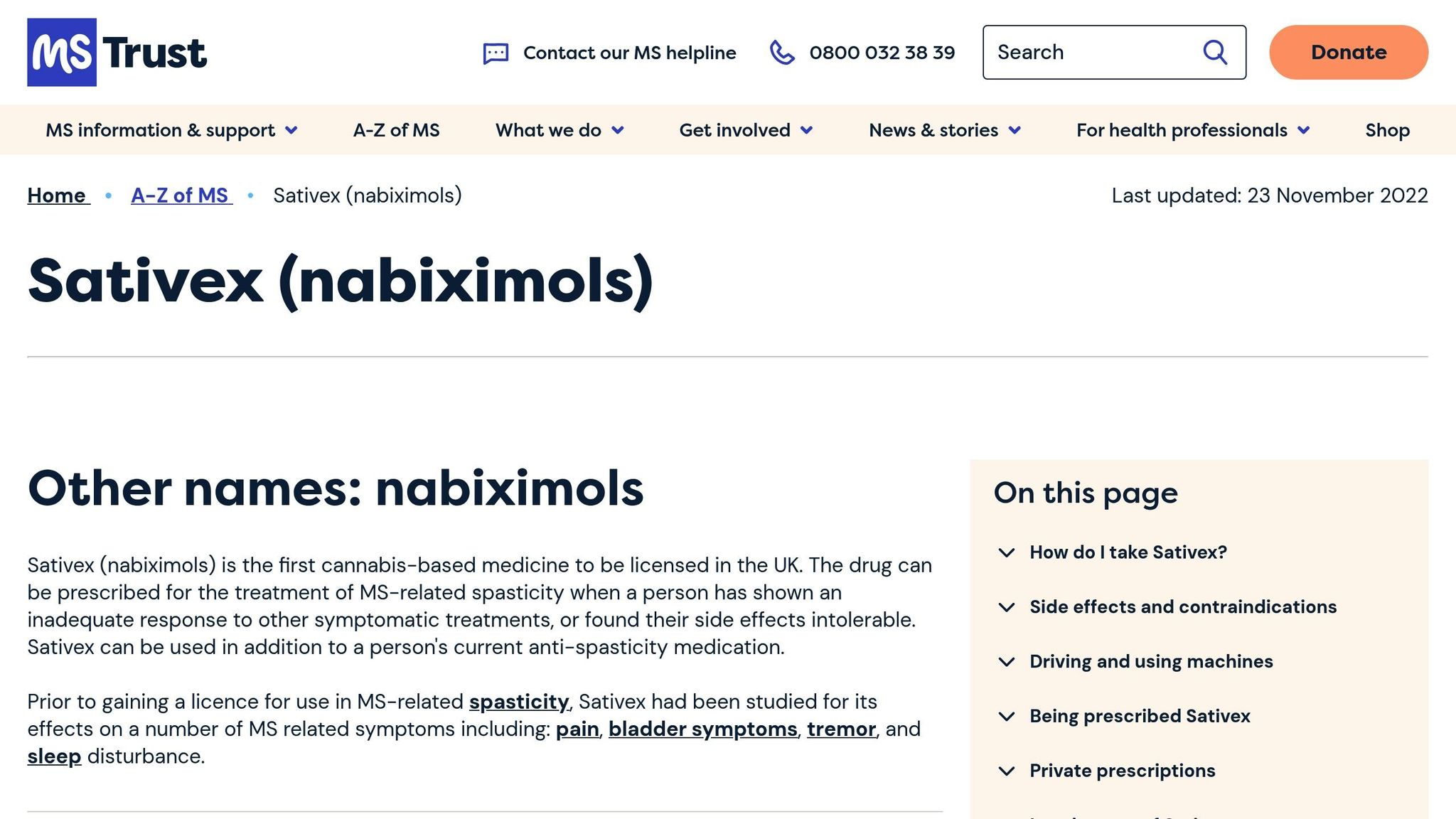MS Spasticity: Medical cannabis, particularly products like Sativex, helps reduce muscle stiffness and spasms in MS patients by interacting with the body’s endocannabinoid system. This system regulates muscle tone and inflammation, which are disrupted in MS, leading to spasticity. THC and CBD, the active compounds in cannabis, work together to calm overactive nerve signals and reduce inflammation.
Key Points:
- MS spasticity causes involuntary stiffness, spasms, and reduced mobility.
- Standard treatments like muscle relaxants often provide limited relief and have side effects.
- Sativex, a THC:CBD spray, is licensed in the UK for MS spasticity when other treatments fail.
- Clinical studies show cannabis-based treatments improve spasticity in around 30% of patients.
- Side effects of medical cannabis are generally mild, including fatigue and dry mouth.
For UK patients, medical cannabis is available through specialist doctors, with private clinics like Elios Clinics offering consultations and prescriptions. While access on the NHS is limited, private options provide more flexibility for those seeking relief.
What is MS Spasticity and How Does it Affect Patients?
What is MS Spasticity?
Spasticity is one of the more specific symptoms of multiple sclerosis (MS), presenting as uncontrollable muscle contractions. Muscle spasticity in MS arises from nerve damage caused by the disease, which disrupts the delicate balance between signals that excite and inhibit muscle activity. The result? Overactive reflexes that lead to stiffness, spasms, and rigidity.
This condition is common among MS patients and can appear at various stages of the illness. Unlike voluntary muscle movements, these spasms and stiffness are involuntary, unpredictable, and often difficult to manage. Symptoms can vary throughout the day, with triggers like fatigue, heat, or infections often making them worse.
Patients may encounter a range of issues, from mild muscle tightness to severe, painful spasms. These symptoms don’t just cause discomfort – they can also interfere with basic voluntary movements. Secondary complications, such as bladder problems and trouble sleeping, often add to the challenges.
How Spasticity Affects Daily Life
Spasticity can have a profound impact on daily life. It limits mobility, reduces independence, and makes activities like walking or moving around more difficult. The increased risk of falling and difficulty performing everyday tasks, such as dressing or cooking, can make maintaining a sense of normalcy challenging.
For many, the condition also disrupts sleep and causes chronic pain, further diminishing their quality of life. In the UK, evaluations from the Medical Cannabis Registry highlight spasticity, along with pain and sleep disturbances, as some of the most challenging symptoms for people living with MS. The psychological toll is equally significant, with many patients reporting heightened anxiety and depression due to the loss of independence and the unpredictability of their symptoms.
Problems with Standard Treatments
Managing spasticity often involves a mix of muscle relaxants (like baclofen or tizanidine), physiotherapy, and sometimes botulinum toxin injections. While these treatments aim to ease muscle tension, improve mobility, and prevent complications like contractures, they frequently fall short. Many patients experience only partial relief or struggle with side effects that can be hard to tolerate.
For example, muscle relaxants can cause drowsiness and affect cognitive function, making them difficult to use long-term. Physiotherapy, while helpful for some, may not provide enough relief for those with more severe symptoms. This leaves many patients feeling dissatisfied, with surveys showing that a large number of MS patients in the UK are unhappy with the effectiveness of current treatments and the side effects they bring.
In search of better symptom control, some patients turn to alternative therapies, including self-medicating with illegally sourced cannabis products. This dissatisfaction with standard care highlights the need for new approaches, such as cannabis-based medicines, which some patients report as providing better symptom relief.
| Treatment Type | Effectiveness for Spasticity | Common Side Effects | Patient Satisfaction |
|---|---|---|---|
| Muscle relaxants | Partial | Drowsiness, weakness | Moderate |
| Physiotherapy | Supportive | Minimal | Moderate |
| Cannabis-based medicines | Modest (patient-reported) | Drowsiness, dry mouth | Higher (in some) |
These challenges with traditional treatments have opened the door for exploring alternative therapies, including cannabis-based options, which some patients have found helpful in managing their symptoms more effectively.
The Endocannabinoid System and MS Spasticity
How the Endocannabinoid System Works
The endocannabinoid system (ECS) is a sophisticated cell-signalling network that spans the brain and nervous system. Its primary role is to maintain balance within the body by regulating various functions. This system relies on three key components: naturally occurring endocannabinoids, receptors (mainly CB1 and CB2), and enzymes responsible for producing and breaking them down. CB1 receptors are primarily located in the central nervous system, where they play a crucial role in controlling neurotransmitter release, muscle tone, and movement. On the other hand, CB2 receptors are found mainly on immune cells and are involved in managing inflammatory responses.
When the ECS is functioning as it should, it ensures nerve signals and muscle contractions are finely tuned, keeping muscle movements smooth and controlled.
ECS Problems in MS Patients
In people with multiple sclerosis (MS), chronic inflammation and nerve damage disrupt the ECS’s normal operations. MS lesions can alter both the density and function of cannabinoid receptors in critical areas of the brain and spinal cord that govern motor control. When CB1 receptors fail to function properly, the regulation of muscle tone becomes impaired. This often leads to involuntary muscle contractions and stiffness – symptoms that make basic activities such as walking, dressing, and even sleeping more difficult for those living with MS.
Additionally, reduced activity of CB2 receptors weakens the body’s ability to manage inflammation. This compromised immune response can create a vicious cycle: heightened inflammation damages nerve tissue further, worsening spasticity and leading to excessive nerve signalling. The result is a loss of smooth, controlled movements. These ECS disruptions highlight the potential for cannabinoids to step in and help restore balance.
How Cannabinoids Work with the ECS
Medical cannabis introduces external cannabinoids that can help stabilise a disrupted ECS, particularly when standard treatments like muscle relaxants and physiotherapy fall short. The two main cannabinoids, THC and CBD, work together within this system in complementary ways. THC partially activates CB1 and CB2 receptors, helping to reduce excessive neurotransmitter activity and muscle spasms. Meanwhile, CBD influences receptor activity and helps lower inflammation, potentially addressing the immune dysfunction associated with MS spasticity.
Research, including double-blind studies and European randomised controlled trials, has shown that combining THC and CBD can significantly reduce spasticity in MS patients. This dual-action approach tackles both the neurological and inflammatory aspects of spasticity, offering a clearer understanding of how medical cannabis can provide relief from these challenging symptoms.
| ECS Component | Location | Role in MS Spasticity | How Cannabis Helps |
|---|---|---|---|
| CB1 Receptor | Central nervous system | Regulates muscle tone and movement | THC reduces excessive nerve signalling |
| CB2 Receptor | Immune cells | Controls inflammation | THC and CBD work to lower inflammatory responses |
How Medical Cannabis Reduces MS Spasticity
How THC and CBD Work
Both THC and CBD play distinct roles in easing MS spasticity, yet their combined effects work harmoniously. THC binds directly to CB1 receptors in the central nervous system, helping to regulate neurotransmitter release and calming the overactive nerve signals responsible for muscle stiffness and spasms. This direct action helps to quieten the neural pathways that contribute to spasticity in MS patients.
On the other hand, CBD takes a more indirect approach, interacting with ECS receptors while targeting neuroinflammation in the spinal cord circuits that manage muscle tone. Unlike its broader anti-inflammatory properties, CBD’s impact on spasticity focuses on specific neurotransmitter systems, like GABA and glutamate, which are crucial for controlling muscle contractions.
When used together, THC and CBD create a complementary effect. THC reduces excessive nerve activity, while CBD fine-tunes neurotransmitter balance, ensuring smoother muscle control. This dual mechanism addresses both the immediate symptoms and the underlying signalling disruptions seen in MS spasticity, providing a scientific basis for the clinical improvements noted in research.
Clinical Studies and Results
The clinical evidence supports what the science suggests: cannabis-based treatments can significantly reduce MS spasticity. One standout example is Sativex (nabiximols), an oromucosal spray containing equal amounts of THC and CBD. In European randomised controlled trials involving over 500 MS patients, Sativex showed statistically significant reductions in spasticity, with improvements ranging from 0.52 to 1.9 points on the Numeric Rating Scale.
In a double-blind study involving 279 patients, 29.4% reported relief from stiffness with cannabis extract, nearly double the rate seen with placebo (15.7%). Systematic reviews have also highlighted that Sativex users are 2.5 times more likely to experience improvements in MS-related spasticity compared to those on placebo. Trials like the SAVANT study further confirmed its effectiveness, particularly as an add-on therapy for patients with moderate to severe spasticity who hadn’t responded well to standard treatments.
Importantly, these studies revealed that nabiximols improved spasticity without causing additional muscle weakness or impairing walking speed, an advantage over some traditional antispasticity medications.
Patient Benefits and Side Effects
The benefits of medical cannabis extend beyond clinical trial data, offering real-world improvements for patients. In a retrospective study, 72% of patients reported pain relief, while 48% noted reduced spasticity after starting cannabis treatment. Similarly, data from the UK Medical Cannabis Registry showed reductions in pain severity and interference, alongside improvements in neuropathic pain symptoms. These outcomes often translate into better mobility, improved sleep quality, and enhanced daily functioning, allowing patients to go about their lives with greater ease.
However, like any treatment, medical cannabis is not without side effects. The most common issues include fatigue, dizziness, and dry mouth. Some patients may also experience mild cognitive effects, such as temporary confusion or memory lapses. That said, most studies find these side effects are mild, tend to diminish over time, and are generally well-tolerated.
| Benefit Category | Patient Outcomes | Percentage Reporting Improvement |
|---|---|---|
| Pain Relief | Reduced pain interference and severity | 72% |
| Spasticity | Decreased muscle stiffness and spasms | 48% |
| Sleep Quality | Improved sleep patterns and duration | Commonly reported |
| Daily Function | Enhanced mobility and activity performance | Varies by individual |
For those considering medical cannabis, Elios Clinics offers comprehensive support, including eligibility assessments, consultations with GMC-approved doctors, and ongoing monitoring. This ensures patients receive tailored care, helping them manage side effects while maximising the treatment’s benefits.
sbb-itb-24979b8
Does Marijuana Treat Multiple Sclerosis? [Sativex (nabiximols), clinical trials, my experience]
Getting Medical Cannabis for MS Spasticity in the UK
For many people living with multiple sclerosis (MS), spasticity can be a challenging symptom to manage. With increasing interest in alternative treatments, understanding how to access medical cannabis in the UK is essential.
UK Laws on Medical Cannabis
Since November 2018, medical cannabis has been legal in the UK for a limited range of conditions, including MS-related spasticity. According to guidelines from the National Institute for Health and Care Excellence (NICE), doctors can prescribe a four-week trial of a THC:CBD oromucosal spray, such as Sativex®, for adults with moderate to severe MS spasticity. This is only recommended when other treatments have failed to provide relief or have caused intolerable side effects. Currently, Sativex is the only licensed cannabis-based medicine approved specifically for MS spasticity in the UK.
However, access can be restricted due to NHS criteria and funding limitations. Only specialist doctors registered with the General Medical Council (GMC) are authorised to prescribe medical cannabis for MS spasticity. These prescriptions may include licensed products like Sativex or, in some cases, unlicensed cannabis-based medicines if there is a clear clinical justification. Dispensing is strictly regulated and typically handled by specialist pharmacies.
Assessment and Prescription Steps
Patients seeking medical cannabis must provide evidence that conventional antispastic medications were either ineffective or poorly tolerated. This includes a confirmed MS diagnosis and a detailed treatment history. While private clinics do not require a GP referral, patients must still undergo an assessment by a GMC-approved specialist with expertise in MS and cannabis treatments.
During this consultation, the doctor evaluates the patient’s medical history, the severity of spasticity, and the outcomes of previous treatments. Patients are required to submit documentation, such as proof of diagnosis and records of prior therapies. If the doctor determines that medical cannabis is appropriate, they will issue a prescription and arrange regular follow-ups to monitor the treatment’s effectiveness. Specialised clinics can provide expert guidance to help patients navigate this process.
Elios Clinics: Specialist Care for MS Patients
For tailored support, clinics like Elios Clinics focus on managing MS symptoms with cannabis-based treatments. Their process starts with a free eligibility assessment, where they review the patient’s MS diagnosis, treatment history, and symptom severity to determine if they qualify for cannabis treatment.
Patients then schedule a video consultation with one of Elios Clinics’ GMC-approved doctors, who have specific expertise in MS and medical cannabis. During this appointment, the doctor discusses the patient’s medical history, current symptoms (such as spasticity), and previously attempted treatments. If medical cannabis is considered suitable, the doctor prescribes a personalised treatment plan, including recommendations for the appropriate strain and dosage.
Elios Clinics also offers next-day medication delivery, either directly to the patient’s home or to a local pharmacy, ensuring convenient access to prescribed treatments. They work closely with the patient’s GP and other healthcare providers to deliver integrated care.
Here’s a summary of their key services and pricing:
| Service | Details | Cost |
|---|---|---|
| Eligibility Assessment | Free initial evaluation | £0 |
| Initial Consultation | Video appointment with GMC-approved doctor | £50 |
| Follow-up Consultations | Ongoing treatment monitoring | £50 per session |
| Repeat Prescriptions | Online requests available 24/7 | £0–£30 |
| Medication Delivery | Next-day delivery | Included |
Additionally, Elios Clinics offers a quarterly subscription plan for £60 per quarter. This 12-month programme includes the initial consultation, follow-up appointments, and monthly prescriptions. For context, private medical cannabis consultations in the UK typically cost between £50 and £200, while Sativex is priced at approximately £375 for a 3 × 10ml pack as of 2024.
Conclusion: Cannabis as a Treatment Option for MS Spasticity
Medical cannabis has emerged as a promising alternative for managing MS spasticity, especially for patients who find little relief from conventional treatments. Research shows that cannabinoids like THC and CBD interact with the endocannabinoid system, helping to ease muscle stiffness and enhance mobility.
Studies across Europe highlight patient-reported benefits, offering moderate-certainty evidence of its effectiveness. Many patients have noted improvements in their symptoms, making it an increasingly viable option for those seeking relief.
One of the key advantages of medical cannabis is its generally mild side effects, such as dizziness, dry mouth, and sleepiness, which are typically manageable for most users. This balance of effectiveness and tolerability has led to more specialist clinics providing regulated prescriptions.
Specialist care plays a crucial role in making this treatment accessible and safe. Clinics like Elios Clinics offer comprehensive services, including consultations with GMC-approved doctors and convenient delivery options. Professional guidance is vital for patients exploring cannabis-based treatments.
“Our specialist doctors are ready to help you understand the potential benefits and possible risks of using medical cannabis.” – Elios Clinics
Considering its interaction with the endocannabinoid system and the clinical results reported, medical cannabis provides a well-supported option for MS patients struggling with spasticity. When used under proper medical supervision, it can significantly improve daily life for those who have not found relief through standard therapies.
FAQs
How can cannabis help relieve muscle spasticity in multiple sclerosis (MS)?
Cannabis has shown potential in easing muscle spasticity in individuals with multiple sclerosis (MS) by working with the body’s endocannabinoid system (ECS). This system is crucial for managing muscle control, pain, and inflammation. In cases of MS, the ECS can become disrupted, which contributes to the stiffness and spasms often experienced with the condition.
Compounds like THC and CBD, found in cannabis, interact with ECS receptors to help re-establish balance. This interaction may reduce muscle tension, improve movement, and alleviate discomfort. When used under medical supervision, cannabis is becoming an increasingly recognised option for managing MS-related symptoms.
How does medical cannabis differ from traditional treatments like muscle relaxants in managing MS spasticity?
Medical cannabis offers a natural option for managing spasticity in multiple sclerosis (MS), standing apart from traditional treatments like muscle relaxants. While conventional medications often focus solely on relaxing muscles, medical cannabis works with the body’s endocannabinoid system. This interaction can help ease muscle stiffness and spasms, potentially enhancing comfort and mobility.
At Elios Clinics, care is tailored to each patient through individualised treatment plans. The clinic places a strong emphasis on safety, quality, and overall well-being, providing expert guidance and support throughout the treatment journey. For individuals who haven’t achieved relief with standard therapies or wish to explore additional options, medical cannabis could offer a way to improve their daily life.
How can patients in the UK obtain medical cannabis for MS spasticity through Elios Clinics?
Patients in the UK seeking medical cannabis to manage MS spasticity can do so through Elios Clinics with a straightforward process:
- Schedule a consultation: Begin by booking an appointment to discuss your symptoms and medical history with a specialist.
- Professional evaluation: A GMC-approved doctor will carefully assess your condition during the consultation to determine if medical cannabis is a suitable option.
- Customised treatment plan: If eligible, you’ll receive a prescription tailored to your needs, including specific guidance on the recommended strain and dosage.
- Home delivery of medication: For added ease, your prescribed medication will be delivered directly to your doorstep.
Elios Clinics prioritises patient care, providing expert guidance and secure access to medical cannabis treatments for MS spasticity.


